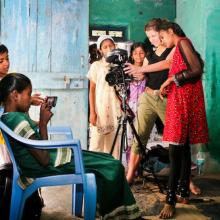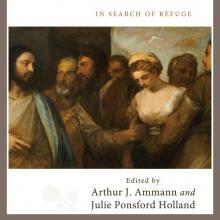Education
Just as she left the world speechless when she addressed the United Nations in July, Malala Yousafzai, the 16-year-old Pakistani advocate for women’s rights and access to education, rendered America's jester Jon Stewart tongue tied when he hosted her this week on The Daily Show with Jon Stewart. Her new book I Am Malala is just released.
"Education is the power of women. That's why the terrorists are afraid of education. They do not want women to get education because then women would become more powerful," said Malala, who is nominated for the Nobel Peace Prize to be announced this week.
The Taliban first targeted Malala on "Googlenet" in 2012, she said. But she decided that it was better to not respond to the threats with violence, even in self-defense.
"If you hit a Talib with your shoe, then you will be no better than the Talib," she told a star-struck Stewart.
"Can I adopt you?" Stewart asked.
The Daily Show
Get More: Daily Show Full Episodes,The Daily Show on Facebook
As with essentially any issue, you can find Christians with opinions all across the board regarding educational policy in the United States. I am not going to pretend there is one “right” political position for Christians to take or that I know all of the factors individuals consider when making choices about their children’s schooling. However, as a Christian, former public school student, and a public school teacher, there are three requests I would make of Christians regarding their conversations and their actions when it comes to education.
1. Please focus your efforts on issues of significance.
In public schools, the loudest Christian voices revolve around issues like the debate about removing “under God” from the Pledge of Allegiance (a phrase added to the pledge in 1954, a pledge that itself was only formally adopted by Congress in 1942). Another hot-button issue involves prayer in schools. When I have participated in “See You at the Pole” events as a student and as a teacher, I felt more like the hypocrite Jesus described praying loudly on a street corner than Daniel refusing to alter his by-the-open-window prayer routine.
WASHINGTON — What’s one way to ensure that a new Hebrew-immersion public charter school isn’t a Jewish school? Hire a priest to run it.
Sela, which means “rock” or “foundation” in Hebrew, opens in Washington, D.C., on Aug. 19. As a public school, Sela may not teach or show preference to any religion. But the intimate connection between Hebrew and Judaism makes some people wonder whether the separation is truly possible.
The question is not just for Sela, but for the dozen or so other public Hebrew charter schools from Brooklyn, N.Y., to San Diego that have started since the first one opened in Florida in 2007. And more Hebrew language charters are in the design stage.
Making things even more complicated is Hebrew’s ties not only to Judaism but to Israel. When the Sela staff began naming classrooms for major cities in Israel this summer, the school’s executive director, Jason Lody, said there would be no class named after the disputed capital of Jerusalem.
“We want to be a public school of excellence,” Lody said. “We don’t want to be sidetracked by political conversations that don’t focus on getting our 4-year-olds ready for kindergarten.”
MY FIRST GUIDED tour of Indianapolis was with a real estate agent, crisscrossing the city in his gleaming black Lexus. He spoke as he drove, filling the air with phrases such as, “Now, this is a terrific neighborhood,” and “You’ll want to steer clear of that one over there.”
As you’d guess, he focused on amenities, or the lack of them: hip restaurants, nearby shopping, nice parks, great schools. Security and consumables, good neighborhoods and bad. A mental map of the city took shape as we drove.
My second tour, just a few days later, was quite different—so different that it changed my life. This time the guide was one of the faculty members at Christian Theological Seminary, the school where I had just been appointed president. She’d lived in the city for more than 20 years, and on her tour, consumables came up now and then, but they took a definite back seat to the creative, groundbreaking ministries going on around town.
Her remarks frequently echoed the real estate agent’s, but from an entirely different angle. She’d say, “Now, this is a low-income neighborhood and a food desert [a section of the city where nutritious, affordable food isn’t readily available]—and right there on the corner is the amazing little church that’s started an organic community garden ministry.” Then a few minutes later: “Now, this is a middle-income neighborhood—and there’s the mosque that’s making a tremendous difference through its youth program.” And so on.
THOSE WHO BELIEVE in freedom and work for justice in our world sometimes grow nostalgic about the 1960s in this country, looking back at the leadership that emerged from African-American churches in the South, drawing allies from outside the region and beyond the bounds of creed. America has a vivid, living memory of faith inspiring public justice. But the civil rights movement did not just happen. The March on Washington and Selma were moments in history made possible by movements that grew out of hard work over the course of decades.
This summer in North Carolina, “Moral Mondays” at the state General Assembly have drawn thousands of weekly protesters, more than 800 of whom have been arrested for engaging in mass civil disobedience. A few weeks into the campaign, some elders started saying it felt like the ’60s all over again. The Washington Post highlighted NAACP state chapter president Rev. William Barber’s dynamic preaching. The New York Times pointed to the significance of hundreds of clergy uniting to lead the movement. MSNBC andFox News set up their satellite trucks. Week after week, thousands of people kept coming.
When reporters asked why, participants explained the concerns: 500,000 people denied health care when the legislature refused federal funds for Medicaid expansion, 70,000 people whose unemployment insurance was cut off, thousands of poor families denied an earned income tax credit, wholesale repeal of the hard-won Racial Justice Act, and diversion of public education funds through a voucher program. The reasons were legion, but they were not, by and large, unique to North Carolina. They were the sort of changes the American Legislative Exchange Council (ALEC) promotes at the state level throughout the country. How, then, did this grassroots resistance movement emerge in North Carolina?
On October 9, 2012, Pakistani teenager Malala Yousafzai was shot in the head by Taliban for advocating for girls' right to attend school. Malala survived the attack, and earlier this month she celebrated her 16th birthday by giving an impassioned speech to the United Nations, advocating for equal rights to education.
This 16-year-old girl was as eloquent and passionate as a seasoned statesman. Her words rang with truth and power. She reminded us that the world is full of vitriol and violence, hate and ignorance — that this is true for people of all faiths, all backgrounds, all political parties. That there is no corner untouched by darkness.
But at the U.N., celebrating her sweet 16, Malala was a light.
I listened to Malala’s story and got chills. As children, before we learned to use politics and policy to defend the lesser inclinations of the heart, we asked: why do people hate? Why do they do harm?
A Terrible Thing to Waste
Many U.S. children living in poverty are further penalized by struggling public schools. Nicole Baker Fulgham, former vice president of faith community relations at Teach for America, offers passionate, practical solutions in Educating All God’s Children: What Christians Can—and Should—Do to Improve Public Education for Low-Income Kids. Brazos Press
Holy Disruption
The documentary Bidder 70 tells the story of a different kind of civil disobedience: Tim DeChristopher helped save 22,000 acres of Utah wilderness by outbidding industry figures at a disputed Bureau of Land Management oil and gas lease auction, with no intention of paying or drilling. www.bidder70film.com
YEAR AFTER YEAR, more than 50 percent of the federal discretionary budget goes to the Pentagon, while only one-third of the non-defense discretionary budget is invested in struggling states and communities—a contrast at the heart of this year’s congressional budget battles. And yet for decades the Pentagon budget has remained sacrosanct while local communities suffer.
From the ground up, activists around the country are fighting back. They are striving to save their communities by calling for cuts in what they perceive as a bloated Pentagon budget—starting in some of the most unlikely places: local city councils.
My organization—the Minnesota Arms Spending Alternatives Project (MN ASAP)—is just one of many groups around the country seeking to shift federal spending priorities from preparing for and waging war to meeting local needs. Through a simple resolution, we build political support by asking churches, organizations, city councils, and state legislators to endorse our initiative to cut Pentagon spending and invest in communities.
In 2011, the Minnesota state government shut down over disputes as to how to address a two-year, $5 billion budget shortfall. Yet Minnesota taxpayers spent nearly $3.5 billion to fund the wars in Iraq and Afghanistan in 2011 alone, bringing total Minnesota taxpayer spending for these wars to $40 billion, according to the National Priorities Project. As in other states, many cities and communities in Minnesota are managing austerity budgets, tightening their belts and laying off police, firefighters, and teachers—all while the Pentagon budget remains unchecked.
In her 1968 poem, “The Speed of Darkness,” the late American poet Muriel Rukeyser penned the line, “The universe is made of stories, not of atoms.”
While the medium is different, a new feature-length documentary, Girl Rising, also bares witness to the same truth in poetic images and stories of girls from around the world.
Through the vivid accounts of nine girls from the developing world — Cambodia, Nepal, Peru, Afghanistan, Egypt, Sierra Leone, Ethiopia, Haiti, and India — and their valiant struggles for the right to be educated, Girl Rising articulates a universal truth: Educating girls ensures a safer, healthier and more prosperous world for all of us.
The film, a project of the 10×10 Campaign to educate and empower girls, paired a girl in each locale with an accomplished writer — novelists, journalists, and screenwriters — from their own developing country to help craft and tell the stories in the girls’ own words.
Elizabeth Smart, who was kidnapped from her home in Salt Lake City and held in captivity for nine months in 2002 at age 14, spoke out about her experience at a human trafficking panel at Johns Hopkins University last week. Her main focus: educating children and giving them the skills to fight back.
She recounted her own experience in abstinence education.
I remember in school one time, I had a teacher who was talking about, well about abstinence. And she said, 'Imagine that you're a stick of gum, and when you engage in sex, that's like getting chewed. And then if you do that lots of times, you're going to become an old piece of gum, and who's going to want you after that?'
… for me, I thought, 'Oh my gosh, I'm that chewed up piece of gum. Nobody re-chews a piece of gum. You throw it away.'
And that's how [easy] it is to feel like you no longer have worth; you no longer have value. Why would it even be worth scraping up? Why would it even make a difference if you are rescued? Your life no longer has value.
Watch the full speech here.
When Uwe and Hannelore Romeike’s asylum case is argued on Tuesday before a panel of federal judges, their lawyers won’t talk about poverty, war, or any of the reasons most immigrants cite in their bid to stay in the U.S.
Instead, they’ll focus on a parent’s right to teach their children at home, which isn’t allowed in the Romeikes’ native Germany. There, homeschooling families face fines, jail time and even loss of custody if their children are not enrolled in a traditional school.
The Romeikes’ lawyers will also talk about their right to teach the Bible during the school day – an angle that has spurred more than 100,000 U.S. conservatives to sign a petition to let the family stay in Tennessee, where they’ve made their home since 2008.
In January 2011, members of Christian Churches Together in the U.S.A. met in Birmingham, Ala., to examine issues of domestic poverty and racism through the lens of the civil rights movement and by reading together Martin Luther King Jr.'s "Letter from Birmingham Jail." As they gathered in the 16th Street Baptist Church under the beautiful Wales Window portraying the black Christ, which replaced the window blown out when the church was bombed in 1963, these contemporary church leaders, representing the broadest Christian fellowship in the country—36 national communions and seven national organizations, including Sojourners—realized that apparently no clergy had ever issued a response to King's famous letter, even though it was specifically addressed to "fellow clergymen [sic]." In 2013, to mark the 50th anniversary of King's letter, Christian Churches Together released its thoughtful response, which we excerpt below. —The Editors
WE CONFESS. As leaders of churches claimed by more than 100 million Americans; as Catholics, evangelicals, Pentecostals, Orthodox, Historic Protestants, and members of Historic Black denominations; as people of many races and cultures: We call ourselves, our institutions, and our members to repentance. We make this confession before God and offer it to all who have endured racism and injustice both within the church and in society.
As church leaders, we confess we have tended to emphasize our responsibility to obey the law while neglecting our equal moral obligation to change laws that are unjust in their substance or application. All too often, the political involvement of Christians has been guided by the pursuit of personal or group advantage rather than a biblically grounded moral compass. We confess it is too easy for those of us who are privileged to counsel others simply to "wait"—or to pass judgment that they deserve no better than what they already have.
We confess that we are slow to listen and give legitimacy to those whose experience of race relations and social privilege in America is different than our own. We keep the "other" at arm's length to avoid hearing the call to sacrifice on their behalf. Our reluctance to embrace our "inescapable network of mutuality" underscores Dr. King's observation that privileged groups seldom give up their advantages voluntarily. For example, it is difficult to persuade most suburban Christians to demand that they strive for the same quality of education in our cities that they take for granted in their own schools. To the extent that we do not listen in love, our influence in society is limited to "a weak, ineffectual voice with an uncertain sound."
I know I am not the only one who is sick and tired of Washington’s manufactured crises around budget and deficit debates. Brinksmanship has replaced statesmanship in trying to find a sound path to fiscal responsibility. It is time to make the right moral choices that will defend the most vulnerable and pursue an opportunity agenda to reduce the highest poverty rate in 50 years.
Ideological debates over the role of government are the real battle in the nation’s capital — more than the debt crisis. Political calculations about the next election are more important to many of our political leaders than the common good of the country.
It’s just time to move on from the partisan politics that has polarized and paralyzed us for so long — by committing ourselves to moral issues that could and should bring us together. The first will be comprehensive immigration reform, which will change the lives of 12 million people in this country, lift many out of poverty, and help the economy at the same time. This is a clear example of how the faith community has changed, and now come together to become a political game changer in Washington, D.C., at both ends of Pennsylvania Avenue on both sides of the aisle.
And it’s time to make another moral commitment in the midst of our growing economic recovery — to include poor families and change poverty into opportunity. Fighting poverty must not be a partisan issue. When we look at both the causes and the solutions, this battle should bring both liberals and conservatives together. Overcoming poverty, by creating opportunity, happens because of three very basic things that most of us can agree on: family, education, and work. All three are crucial and necessary in moving people out of poverty and into opportunity.
Let’s break it down.
Kabul —Yesterday, four young Afghan Peace Volunteer members, Zainab, Umalbanin, Abdulhai, and Ali, guided Martha and me along narrow, primitive roads and crumbling stairs, ascending a mountain slope on the outskirts of Kabul. The icy, rutted roads twisted and turned. I asked if we could pause as my heart was hammering and I needed to catch my breath. Looking down, we saw a breathtaking view of Kabul. Above us, women in bright clothing were navigating the treacherous roads with heavy water containers on their heads or shoulders. I marveled at their strength and tenacity. “Yes, they make this trip every morning,” Umalbanin said, as she helped me regain my balance after I had slipped on the ice.
About 10 minutes later, we arrived at the home of Khoreb, a widow who helped us realize why so many widows and orphans live in the highest ranges of the mountain. Landlords rent one-room homes at the cheapest rates when they are at this isolating height; many of the homes are poorly constructed and have no pipes for running water. This means the occupants, most often women, must fetch water from the bottom of the hill each and every morning. A year ago, piped water began to reach some of the homes, but that only meant the landlords charged higher rent, so women had to move higher up the mountain for housing they can afford. It only made their daily water-carrying longer and more arduous.
Beau Underwood reminded us at this year’s Sojourners’ Christmas chapel that Jesus was not born into a calm, peaceful world in a serene nativity scene. It was a chaotic world in which the Jews were oppressed by Roman rule and Jesus’ very act of being born freaked Herod out, resulting in a mass genocide of baby boys. All was not calm and peaceful as the birth of Jesus challenged the sinful powers and structures of the world from the very start of his life.
This Christmas the world remains a very frightening and chaotic place for many children around the world. Jim Wallis and I met with former U.K. Prime Minister Gordon Brown just a few days ago and Gordon told us about a group of children in Delhi, India who were being held in unspeakable conditions — forced to work for up to 15 hours a day making Christmas decorations.
Children! Forced slave labor, some of them as young as 8 years old, imprisoned, beaten, and required to make decorations intended celebrate the birth of the savior of the world. Making matters worse, these are only a few of millions of young children trafficked into slave labor around the world all year long. What horrible irony.
EXCLUDING WOMEN from leadership weakens the commitment and contributions of churches, theological institutions, and the global church in their participation in God's prophetic mission. It translates to women's priorities and specific needs being inadequately articulated and under-resourced.
For instance, matters of sexuality, reproductive health education, and justice are hardly ever discussed in churches or theological institutions, except when governments want to legalize abortion. Similarly, little attention is given to maternal health care despite the high rates of maternal death and infant mortality in Africa. It is not enough for churches to focus on baptizing children, blessing them, and welcoming them into the house of God when they neglect to care for their well-being from the time they are in their mothers' wombs, especially now that so many children are born HIV-infected. Responsible and healthy sexuality, childbearing, and parenting are matters that require full engagement of both women and men, and the churches should be at the forefront of providing much-needed education.
Women have been left to shoulder the burden of the times: preventing HIV transmission, facing HIV-related stigma, handling deaths, and addressing the myriad other adverse impacts that the HIV pandemic has created. Similarly, in the Circle of Concerned African Women Theologians, of which this author is a founding member, women have provided leadership in naming theological, ethical, cultural, and religious beliefs, as well as harmful practices and leadership styles, that fuel gender disparity, social injustices, and the spread of HIV in religious communities and in society at large. The Circle also has endeavored to provide theological and ethical reflections that are empowering and transformative to the behaviors contrary to God's will for how women and men relate to each other in families, religious contexts, and everyday life.
During my first year as a second-grade teacher, I struggled with classroom management. I am a soft-spoken person by nature and habit. I didn't have the experience to help me set up great rules and procedures for my students. My classroom was noisy and chaotic. I think you could hear us all around the school.
A well-meaning colleague stopped me one day after school and offered, "Trevor, you need to find your teacher voice. Most of the children at our school won't listen to you unless you yell at them. You need to show them who's boss."
After five years of teaching, I agree that it is important to find your teacher voice. I disagree, however, that your teacher voice needs to be mean and bossy. I found my voice. It’s nurturing and supportive and one that students can internalize for positive growth and change.
I thought about this teacher voice when I met 7-year-old Maria. On her first day in reading intervention classroom, she made a mistake on a skill sheet. She asked for an eraser but I said, "Don't worry if you make a mistake. You don't have to erase it. Just cross it out and fix it. I'll never be angry with you if you make a mistake. I just want you to try to fix it."
It’s been said before, but it’s worth saying again. One of the surest ways to reduce poverty is to provide an education for girls. Yet, as AFP reports, a new study shows there is still a long way to go.
“Millions of girls worldwide are condemned to lives of hardship because they don't go to school, an education gap that entrenches broader extreme poverty, a new report said. The report, "Because I am a Girl: The State of the World's Girls 2012," was released in New York by Plan International on the first International Day of the Girl organized by the United Nations.
"The estimated 75 million girls missing from classrooms across the world is a major violation of rights and a huge waste of young potential," the child poverty alleviation group said in launching the report.”
The full 200-page study is HERE.
Speak out for those who cannot speak,
for the rights of all the destitute.
Speak out, judge righteously,
defend the rights of the poor and needy.
~ Proverbs 31:8-9
ADDIS ABABA — These words of King Solomon have been running through my mind since our ONE Moms delegation — 13 mothers from the United States, the United Kingdom, and France — arrived in the Ethiopian capital on Sunday.
I hear these verses as a clarion call to action. As someone who strives humbly to follow the Way of Jesus and be involved in The Work that God is doing in the world, I want to respond and do what these verses command.
And as a believer who also happens to be a mother (a fairly novice one, still learning the ropes, if you will), I must do.
Sunday afternoon, after us ONE Moms dropped our luggage at the hotel, piled into our chartered bus, and drove to the outskirts of the city to the Mary Joy Aid Through Development Association, we met our Ethiopian sisters who are speaking out for those who cannot; who are advocating on behalf of the destitute, judging with righteous wisdom, and defending the rights of the poor and the needy.
In 2007, I boarded a plane bound for Africa for the first time.
That trip took me to Kenya, Tanzania, the island of Zanzibar, and Malawi.
And that trip changed me — heart, mind, soul — forever transforming my family and my world.
Today, five years almost to the day since I flew to Nairobi to begin my first African adventure, I'm sitting in the international terminal of Dulles airport in Washington, D.C., waiting to board a 787 Dreamliner bound for Addis Ababa, Ethiopia.
An adventure lies ahead. And yet, so much more than that.
I've been to Africa twice now (this is my third visit to continent), and each time the people I've met and experiences I've had on the journey — all of it dripping with a grace so palpable I could almost smell it like so much sandalwood smoke wafting from an incenser — have shaped me and recalibrated my spirit.
I don't know specifically what Ethiopia has in store for me, but I am sure of one thing: The Spirit will be there.















